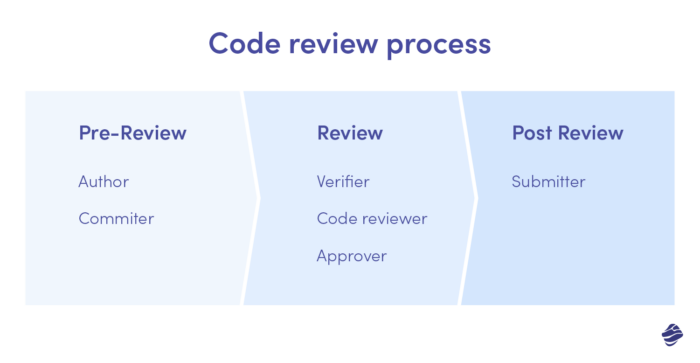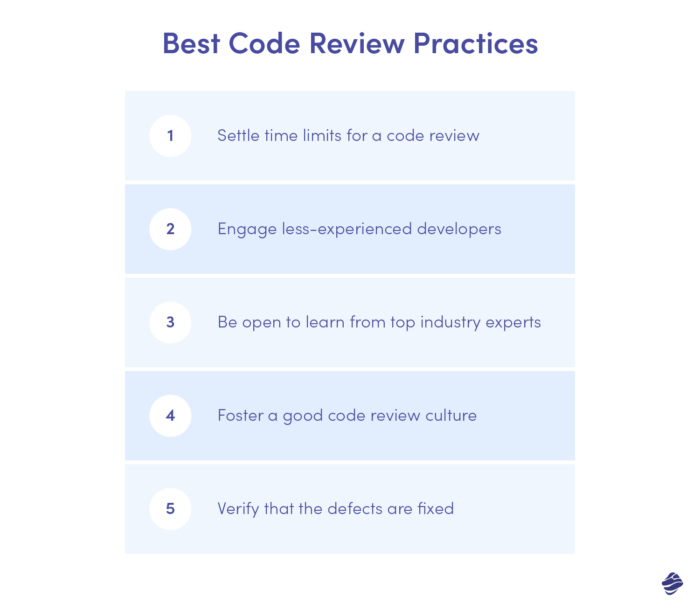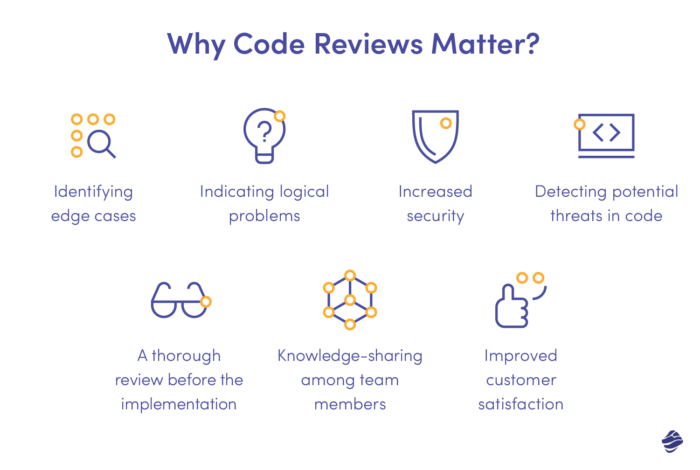What is code review? Let’s begin with a little bit of history. The first formulated and published code review is credited to IBM researcher Michael Fagan, who introduced the process in 1974. Fagan’s accomplishment quickly became one of the most critical software development processes and has been used worldwide for almost five decades. At the Global DevSecOps Survey, nearly 76% of developers admitted that this software development stage is its most valuable part.
Why technical employees are happy when someone audits their work? The answer is simple. Because both sides (Submitter and Reviewer) have clear benefits. An ambitious developer should seek to work with the best experts and foster his professional growth on a regular basis. There is no better way to increase programming skills than writing lots of code – and, even more importantly, reading excellent code. Hence, regular and precise code review is necessary for any software company, startup or individual developer.
The technological reasons for paying attention to code review are clear. But what are the benefits of code review from a business perspective? What is a good code review process? What impact does it have on application modernization? Let’s take a deep dive into all these topics.
What is code review

Let’s begin with a brief definition. What is code review? Code review is a process in software development services where a developer submits their code to be reviewed by another developer or team member. The reviewer checks the code for bugs, logical errors, coding standards and best practices. The main goal of code review is to improve the software’s quality, provide a good knowledge flow within a development team, and foster a knowledge-sharing culture within a company.
What is a good code review process
In short, a good code review should be:
- constructive
- limited
- instructive.
What does it mean in practice, though?
Most importantly, a good code review process should be performed by seasoned developers. Not only does it allow for mentoring less experienced junior or regular developers and streamlining knowledge flow within an organisation, but it also guarantees greater sensitivity to bugs and bad software development practices. In other words, a good code review is a win-win situation – both for the developer and his team, and for the client.
What should you also know about a good code review process?
Constructive code review needs time
It is a no-brainer that constructive things take a long time. And it is no different in the case of the code review. As a backend team leader at a software development house with an established code review culture, whenever I hear something like “I looked at the code from top to bottom, and it seems OK”, I know that this code review is not a constructive one – and hence, should be repeated. Freelance and outsourcing developers tend to forget to calculate the time needed for code review in their estimations. Therefore, it is a good practice to ensure the code review is already calculated in the software development process before the project starts (especially while choosing the time and material pricing model).
Code review increases feature delivery time
Sometimes a given functionality is constantly thrown by the reporter and the reviewer like a ping-pong ball. Is that bad? It is not! At least to a certain extent. While dealing with constructive feedback, the parties will disagree on some topics. However, if code review transforms into constant arguing about a solution, affecting code delivery time and sprint closure – it’s time to interfere. If a conflict of interest emerges, you should ask your software development partner to, e.g. run pair programming.
Good code review practices for software development teams
Imagine two movie critics: one specialised in comedies, and the other specialised in crime movies. They perform similar activities: analyse the movie’s plot, characters and visual elements. At the same time, they use different methodologies – and hence, pay attention to different details. The same applies to programmers. Two different developers may not always be able to approach code review with the same level of formality, quality or even scrutiny. However, as people working in the same tech industry business, they are obliged to follow similar good code review practices. When conducting a code review, you should pay attention to several things to ensure the code is of high quality.
So, what are the critical areas to focus on while establishing code review culture in your company?

Set time limits for a code review
It’s hard to define a specific number here. The time it takes to perform a code review can vary depending on several factors, such as the quantity and complexity of the code, the experience level of the reviewer and the quality of the code. Obviously, it’s important to take the necessary time to perform a thorough code review. However, seeing programmers spend hours analysing someone else’s solution would make me slightly suspicious.
Engage less experienced developers
The code review process is a win-win situation. It helps the author, who gets his skills reviewed, and the code reviewer – who learns how to give feedback and develops his programming skills by reading and analysing code. Hence, it is crucial to involve junior programmers in this valuable process. Frequently, the new blood brings fresh ideas and exciting software development solutions.
Take advantage of peer reviews
Peer reviews should be your first choice in the code review process. Peer reviewers are seasoned developers with expert knowledge of given languages and frameworks; aware of the project goals and requirements. Suppose you have no choice and must engage someone outside the project for code review. In that case, you should be aware that this person (regardless of their technical knowledge and experience) does not know much about your business or product. This could result in a code review that would be deprived of a decent, functional analysis of a given feature in the context of the entire project. While the external code reviewer might analyse the overall code quality, the elements related to the proper functioning of the whole website or app may be omitted.
Business benefits of code review processes
From the business perspective, one of the main goals of code review is to deliver a flawless service or a feature to the end user. But is that all that code review has to offer? What are the other results of a good code review?
Edge case identification
Code review helps the team identify edge cases that can be missed during development. This helps to reduce the number of customer complaints and increase customer satisfaction. Additionally, early identification of edge cases lowers the cost of fixing potential errors in code.
Logical problem identification
Code review allows developers to identify the logical problems that could be missed even after delivering the software. Identifying such issues during the development process can reduce the cost of fixing them and prevent customer complaints. Additionally, it helps the team produce more efficient and maintainable code.
Increasing security and detecting potential threats in code
Code review is critical to ensure that the software is secure and prevents customer data from being compromised. It helps to identify any potential security threats in the code, which can help reduce costs associated with fixing bugs and vulnerabilities and minimise the risk of customer data being stolen or leaked.
Furthermore, it helps ensure the code adheres to coding standards and best practices and identifies improvement opportunities. The review process helps to ensure that the code is of the highest quality and is secure and robust. Additionally, it provides valuable feedback to developers on their code and helps to identify any areas that need further attention.
Obtaining a second opinion on the implementation
Obtaining a second opinion on the implementation can help identify any potential problems or areas of improvement and help developers understand the code better. Additionally, it can help to ensure that the code is of the highest quality and adheres to coding standards and best practices. Furthermore, it provides valuable feedback to developers on their code and helps to identify any areas that need further attention.
Active knowledge sharing among the team
Code review brings double benefits: the Subscriber gets valuable knowledge from a review, but also the Reviewer can learn something new from a Subscriber. That’s why this part of the process usually is a win-win condition for both sides. Additionally, the knowledge about the business features is spread automatically between Subscribers and Reviewers. Thanks to that, it is safe to say that code review ensures excellent business understanding in the development team.
Improved cooperation between team members
Involving multiple people in the code review process: the author of the code, peer reviewers, technical leads, and junior and senior developers allows to ensure that the code is of high quality but also provides an opportunity for knowledge sharing and collaboration. A well-performed code review, based on mutual trust and respect within the team, fosters a culture of continuous improvement and teamwork.

Why code review is an essential part of software development
Code review has numerous advantages for businesses regarding time and cost savings and improved customer satisfaction. It helps to identify edge cases and logical problems, increase security and potential threats in code, obtain a second opinion on the implementation, and improve teamwork. Additionally, it can help to ensure that the code is of the highest quality and adheres to the best coding standards and practices. By implementing code review as part of your development process, you can ensure that your project is on track and results in a quality product.
Code review improves communication within a team, simplifies bug identification, streamlines development, and helps companies to deliver their projects on time and within budget. If you are looking forward to developing a software product, include a code review in your development process and follow the above code review checklist to make this process simple and effective.









